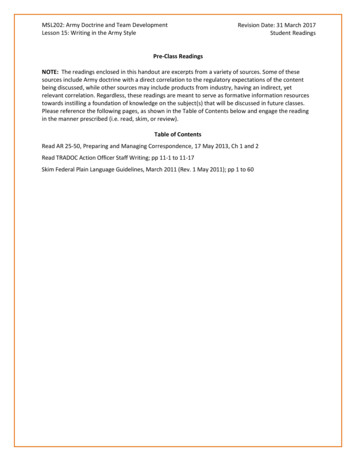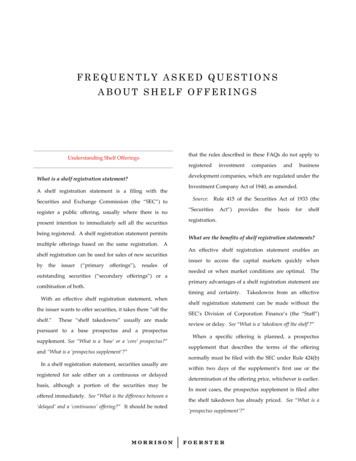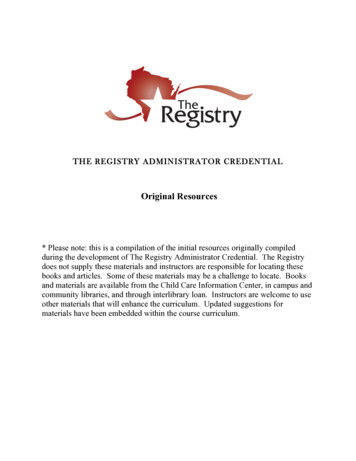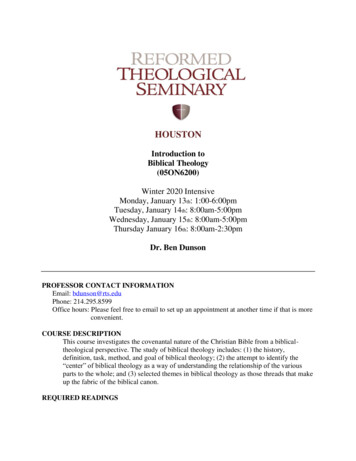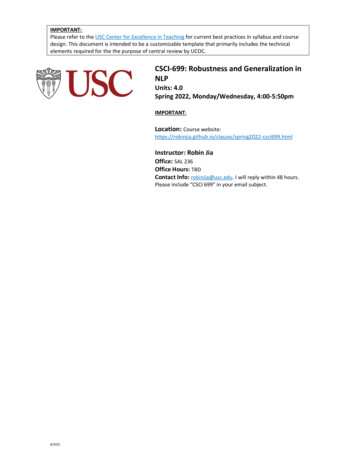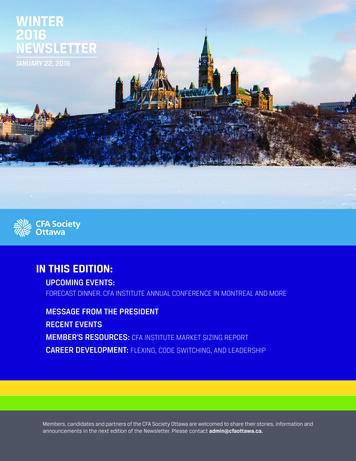
Transcription
Tithe & Offerings Readings2016Stewardship ThreadThrough the BiblebyDr. Danijela SchubertStewardship Ministries DepartmentGeneral Conference of Seventh-day Adventists
ATTENTION!Dated material to be adapted,translated and distributed toSeventh-day Adventist churchesbefore December 2015 for January 2016.This resource is for use during the divine service before the offering is collected. Itmay be bound so that the page for the day can be easily torn off and taken onto thepulpit by the designated elder/offering facilitator. It may also be downloaded onlinefrom www.adventiststewardship.com on the resources page. Each week’s reading willalso be posted on www.facebook.com/Dynamicstewards by Thursday of each week foraccess by local elders, service leaders and interested members.The Tithe and Offerings Readings booklet was edited and prepared by theStewardship Ministries Department, General Conference of Seventh-day Adventists,12501 Old Columbia Pike, Silver Spring, MD 20904, USA, 2016. The documentwas amended by the Stewardship Ministries of the Southern Africa Indian OceanDivision for it to align with the combined offering system that is practiced throughoutthe Division’s territory.This material may be translated, printed, or photocopied by Seventh-day Adventistentities without securing further permission. Republished documents should includethe credit line: Stewardship Ministries Department, General Conference of Seventhday Adventists.We welcome your comments and suggestions for future authors and themes for theTithe and Offerings Readings.Unless otherwise noted, all Bible texts are taken from the New International Version.Texts credited to NIV are from the Holy Bible, New International Version , NIV Copyright 1973, 1978, 1984, 2011 by Biblica, Inc. Used by permission. All rightsreserved worldwide.
ForewordBy Penny BrinkAssistant Director, GC Stewardship MinistriesThis year’s Tithe and Offerings Readings: Stewardship Thread through the Bible, is written byDr. Danijela Schubert. Among her other responsibilities, she is the Stewardship Liaisonperson in the South Pacific Division, in Sydney, Australia. Her decision to follow thestewardship thread through the Bible reminds us that God, in His wisdom, has providedeverything we need to learn in His Word, and that stewardship is part of that wisdom.In God’s Word, both the written word, and the Word who became flesh and dwelt among us,we have the perfect example of stewardship. Jesus came to do the will of His Father, and, asgood stewards, and disciples of Jesus, so should we. Jesus, however, took things one stepfurther. Not only was He the ultimate steward and our example, He was also the Master, whogave His life for His stewards. Can there be any reserve left in us when we consider just howmuch He gave!I had the privilege of meeting Danijela and another one of our stewardship colleagues,Lyndrea Maywald, while traveling in Australia in April 2015. It’s always good to connect withthose who are our partners in stewardship education around the world.We look forward to following the stewardship thread through the Bible with you in thesereadings this year!L-R:Danijela Schubert, Lyndrea Maywald, PennyBrinkBiographical Sketch of Dr. Danijela SchubertDanijela was born and grew up in the Mediterranean city of Pula, in Croatia,which was part onalacommunistawitnesstowas brought up infamily that facedchallenges and incountry, her life isGod’s grace.Belonging to theAdventist churchplaces—first toSeventh-daytook her to manyboardinghigh
school where she met her future husband.Together they have since lived, studied and worked in many countries,including France, the Philippines, Pakistan, Papua New Guinea and Australia.Danijela has completed two Masters degrees and a Doctorate, and haspublished two books. For most of her career, she worked as a theologylecturer. She is currently working at the administrative offices of the SouthPacific Division of Seventh-day Adventists in Sydney, Australia.Danijela is happily married to Branimir. Together they have two grown upsons.
Purpose for these Readings:These readings are meant to provide a spiritual framework and create a worshipfulatmosphere for giving on Sabbath mornings. While the offerings listed (headingsonly) in this resource follow the 'Calendar of Offerings' plan, the readings themselvesare generic in nature, and can therefore be used no matter what offering plan thelocal division is following. The inclusion, however, of specific offerings as listed is foreducational and information purposes only, thus helping stewards and givers to knowhow their giving supports Adventist mission globally through the General Conferenceand Church ministries locally (local church, Conference, Union and Division).
Sabbath 1January 2, 2016Genesis 21:33: Abraham planted a tamarisk tree in Beersheba, and there hecalled upon the name of the LORD, the Eternal God.One day Abimelech, together with Phicol, the commander of his forces, cameto Abraham. They acknowledged that God was blessing Abraham. Some timebefore, Abraham with his 318 trained men defeated four kings and theirarmies. Abimelech decided he should develop a friendship with such aperson. They made a treaty that they would not deal falsely with each other,their children, or their descendants. Abimelech appealed to Abraham to bekind to him and to the country in which he lived as a foreigner. Abrahamagreed. At the same time, they also sorted out some differences surroundinga nearby well.What did Abraham do next? He planted a tree and acknowledged God!We, too, need to show kindness to our neighbors and the country in which welive. Imagine if each Adventist member planted a tree this year as an act ofworship in acknowledgment of the Creator God!Appeal: This year, let us show that we care for the world that God created.Let us be kind to one another, and be kind to the land. Plant a tree, or giveback in other creative ways.Prayer: Thank You, God, for creating the world! May we take care of it andone another as well.
Sabbath 2January 9, 2016Exodus 15:20: Then Miriam the prophet, Aaron’s sister, took a timbrel in herhand, and all the women followed her, with timbrels and dancing.It was not easy leaving the familiar—even if it was the land where they hadbeen slaves. The Israelites needed to trust Moses, trust the stories about theirancestors, trust the promises those stories held.God showed them, through many miraculous plagues, that He was morepowerful than all the Egyptian gods. Still, when they were faced with water infront and the Egyptian army behind, they were afraid.How awesome it must have been walking through the dry waterbed, looking atthe walls of water, and walking through the miracle. Still, it wasn’t easy; thearmy was behind, pursuing them.Then when the last Israelite crossed the sea the water wall collapsed, and theenemy was defeated. A spontaneous song erupted in the Israelite ranks, ledby Moses and Miriam: a song of praise, a song of joy.Appeal: Like Miriam, may we also express our joy for God’s salvation. Maywe also follow those who lead us in joyful praise. May our giving today comefrom a joyful, grateful heart.Prayer: Open our eyes, God, to see Your miracles in our lives!
Sabbath 3January 16, 2016Leviticus 27:30: A tithe of everything from the land, whether grain from the soilor fruit from the trees, belongs to the Lord; it is holy to the Lord.While the Israelites were on their way from Egypt to Palestine, manyinstructions were given them. They were starting a new nation in thePromised Land, and they needed to form a good government. They knew howsociety functioned in Egypt, especially how slaves were treated, but that is nothow God wanted this new society to function.Leviticus 27 is not the first place where tithing is mentioned in the Bible;Abraham had already tithed. Offerings to God were a well-establishedcustom.A tithe, or a tenth, belongs to the Lord. When we bring to God our tithe, weare simply returning something that does not belong to us in the first place. If Iget 10 apples, I need to return one to God because it belongs to Him.Appeal: Reflect on all that we have received from God. Have I returned therequired tenth to the Owner?Prayer: Thank You, God, for the blessings we receive from You. Help usreturn to You the small percentage You have requested of all that belongs toYou!
Sabbath 4January 23, 2016Numbers 14:2: All the Israelites grumbled against Moses and Aaron, and thewhole assembly said to them, “If only we had died in Egypt! Or in thiswilderness!”Perhaps this is a strange verse to read for an offering-time reflection. This isnot the only verse where the Israelites are found grumbling, murmuring, andcomplaining. We may think that if we were in their situation we would havebehaved differently. Would we?Each one of us may be facing different challenges today. Some facechallenges associated with poverty, some with abundance. Some mayexperience the fear of persecution, sickness, and death, while others may bequite bored within a peaceful and easygoing life.What is our attitude to life’s situations? Do we complain like the Israelites did?Do we also think that somewhere else would be better?We have a choice in how we view our circumstances. We can see in themeither something good or something bad. This choice will also be reflected inour gifts to God.Appeal: Resolve today to foster an attitude of gratitude and not one ofgrumbling.Prayer: We trust Your ways are the best ways, Lord. Lead us through this lifein the best way for us, and help us not to grumble.
Sabbath 5January 30, 2016Deuteronomy 15:11: “There will always be poor people in the land. Therefore Icommand you to be openhanded toward your fellow Israelites who are poorand needy in your land.”It is true today as it was several thousand years ago when this verse waswritten—there are poor people on this planet.Being poor means different things in different places and different societies.Being poor may mean not being able to afford a television, mobile phone, or anew car in one place, but it may mean not being able to afford the next mealin another. On the other hand, there are some people who are poor inmaterial goods but rich in spirit. Likewise, there are those who abound inmaterial things but are not satisfied.In whatever category we may find ourselves, God’s command stands: to beopenhanded toward our brothers and sisters—which does not refer only to ourown relatives but to all the poor and needy, in whatever way they may be poorand needy. We can always help someone who is lacking more than we are.Appeal: Look around you and find someone you can help today.Prayer: God, thank You for your openhandedness toward us. Help us also tobe generous!
Sabbath 6February 6, 2016Joshua 14:10, 11: “Now then, just as the Lord promised, he has kept me alivefor forty-five years since the time he said this to Moses, while Israel movedabout in the wilderness. So here I am today, eighty-five years old! I am still asstrong today as the day Moses sent me out; I’m just as vigorous to go out tobattle now as I was then.”I wonder how many of us would or will be able to make such a statement—that we have the same strength and vigor at 85 as at 45! I wonder if all thewalking in the wilderness and the simple food and lifestyle might have beenpartly responsible for Joshua’s strength.Stewardship is much more than returning tithe or giving offerings. To be asteward is to take care of that which has been entrusted to us. We were givenour bodies, and we need to take care of them. In fact, nobody can take care ofour body if we don’t. An accountant can take care of God’s tithe and ourofferings, but not our health.Appeal: Let us honor God with our bodies and the way we take care of them.Prayer: Our Creator! Thank You for the bodies you have given us. May ourgiving reflect our gratitude.May we take care of our bodies to Your glory and as an example to thosearound us!
Sabbath 7February 13, 2016Judges 2:10: After that whole generation had been gathered to theirancestors, another generation grew up who knew neither the Lord nor whathe had done for Israel.The book of Judges contains some of the most bizarre and gruesome storiesin the Bible. Several times it tells how “everyone did as he saw fit” (17:6,21:25). They acted not according to the laws God had given them in order toprosper and have a just society, but did as they pleased. This book presents achallenge to all who have experienced God in their life. They and theirchildren are likely to follow God, but the third generation is likely to reject Himif He is not intentionally pursued. Each person needs to experience God forthemselves. Those longer in faith need to keep sharing their stories of God’sinvolvement in their lives, to mentor the young ones and pray for them, butalso to allow them to find God for themselves. One such way of mentoring theyounger generation is to share how being a steward of all that God has givenhas been a blessing throughout life, with specific examples.Appeal: Those established in faith, please share your experience withyounger ones.Prayer: Dear God, help us not to repeat the mistakes of old, but to worshipYou through all generations.
Sabbath 8February 20, 20161 Samuel 15:22, 23: But Samuel replied: “Does the Lord delight in burntofferings and sacrifices as much as in obeying the Lord? To obey is betterthan sacrifice, and to heed is better than the fat of rams. For rebellion is likethe sin of divination, and arrogance like the evil of idolatry. Because you haverejected the word of the Lord, he has rejected you as king.”It didn’t take long for Saul to change from someone of the “smallest tribe ofIsrael” and “the least of all the clans of the tribe of Benjamin” (1 Sam. 9:21)into someone who set up “a monument in his own honor” (15:12) and have hisown interpretation of God’s directions. Samuel asked him, “Why did you notobey the Lord?” and Saul answered, “But I did obey the Lord!”Today we came here to worship God in different ways, one of which is bygiving our offerings. Before we give our offerings to God, perhaps we need topause for a moment to examine our attitudes. Are we placing the rightemphasis on obeying God’s Word? Is giving a generous offering a way ofexcusing our lack of kindness toward others? Like buying gifts for our childreninstead of spending quality time with them?Appeal: Let us submit to God’s ways instead of our own.Prayer: May our hearts be always turned to You to listen to Your voice, God,to obey, and then to give!
Sabbath 9February 27, 20162 Samuel 6:5: David and all Israel were celebrating with all their might beforethe Lord, with castanets harps, lyres, timbrels, sistrums and cymbals.How wonderful it is to celebrate! Sometimes we get very busy. Day after day,and even on Sabbath, our spirits might be affected by the heavy burdens wecarry. Part of our stewardship is also to celebrate. How much easier ourburdens are when there is a song in our hearts!In this story, David arranged for the ark of the covenant to be brought toJerusalem, and when it arrived it was cause for major celebration. There wereinstruments, songs, dancing, and great food. The people celebrated with “alltheir might before the Lord.” It seems that along with a spirit of celebrationthere is also a spirit of giving. David “gave a loaf of bread, a cake of dates anda cake of raisins to each person in the whole crowd of Israelites, both menand women” (2 Sam. 6:19).Appeal: Let us celebrate God’s goodness and give gifts to God and oneanother with joyful hearts.Prayer: Lord, we want to celebrate this day—celebrate Your goodness towardus and the salvation we have in You!
Sabbath 10March 5, 20161 Kings 3:12, 13: “I will do what you have asked. I will give you a wise anddiscerning heart, so that there will never have been anyone like you, nor willthere ever be. Moreover, I will give you what you have not asked for—bothwealth and honor—so that in your lifetime you will have no equal amongkings.”What a promise given to Solomon! We would all like to receive such apromise, wouldn’t we? To have wisdom, riches, and honor—what else couldone wish for? But not every one of us experiences such a promise given.Some of us may be rich, some poor. Some of us may have honor among thepeople with whom we mix, but some of us may not.There are, however, parts of this verse that apply to all of us. There has neverbeen anyone like you, nor will there ever be. Each one is special, different,and extremely valuable in God’s kingdom.Ask yourself what God has done that you have asked for? What has Godgiven you that you have not asked for? What are the blessings that you haveexperienced?Appeal: Be aware of God’s blessings. Be grateful.Prayer: Thank you, God, for Your many blessings. Thank You for answeringour prayers and giving us more than we have asked for.
Sabbath 11March 12, 2016Written by Shelley Nolan Freesland, for AWRHow do pastors care for new believers when they alone have theresponsibility of serving three churches and 11 Sabbath schools spreadacross a 200-kilometer radius?That is the challenge one such pastor faces in Kenya. He says, “I have beenbicycling for five years now, and my health has been affected. So I usuallywalk, and stop to sleep along the way. It takes two days to reach one village,so I do not get back home until Monday afternoon.”Adventist World Radio’s broadcasts not only introduce listeners to Jesus, theyalso continue to nurture them in the absence of church workers. In countriessuch as Kenya, Vietnam, Madagascar, and more, people in remote orrestricted areas have formed “AWR churches.” They learn—in their ownlanguage—about salvation, the true Sabbath, and Jesus’ unfailing love forthem.Appeal: AWR programs can be heard on shortwave, AM/FM, and online inmore than 100 languages. Your generous offering will keep the voice of hopetraveling to the farthest corners of the globe. Thank you for your support!Prayer: Dear Lord, multiply the effects of AWR around the world through ourofferings!
Sabbath 12March 19, 20162 Kings 12:9: Jehoiada the priest took a chest and bored a hole in its lid. Heplaced it beside the altar, on the right side as one enters the temple of theLORD. The priests who guarded the entrance put into the chest all the moneythat was brought to the temple of the LORD.King Joash was a king who did what was right in the eyes of the Lord, andone of his passions was to repair the temple. He instructed priests on how tocollect the money needed to achieve this goal. Even though they followed hisinstruction, the temple was not fully repaired even many years later. It wastime for new ways of acquiring funds. Jehoiada decided to bore a hole in thelid of the chest, and that seemed to work far better than previous methods.Today there may still be a need to repair a meeting place. There may be otherneeds in the work for God. We may need to use new and effective means ofcollecting resources to accomplish them.Appeal: Let us be creative in finding ways of gathering the funds that areneeded. Let us be open to adopting new ways that may be presented to us.Prayer: Thank You, God, for You are limitless. May we willingly tap into Yourcreativity to further Your work!
Sabbath 13March 26, 20161 Chronicles 21:24: But King David replied to Araunah, “No, I insist on payingthe full price. I will not take for the LORD what is yours, or sacrifice a burntoffering that costs me nothing.”Araunah was offering David his land, his oxen for the burnt offering, wood forfire, and grain for another offering—all as a gift. David could have said: “Great!I’ll take all that.” It would have been easy. There was nothing wrong inAraunah offering this to David, nor for David to accept it. David, however, didnot think this was the right way. He wanted to offer to God something from hisown possessions. He wanted to pay the full price for the goods he wasacquiring.Today, does it cost you anything to give to God, or is it easy? Have you paidthe proper price for goods you attained?Appeal: Let us honor God by paying the proper price for things and serviceswe receive. Let us bring to God an offering that has cost us something.Prayer: All we have is Yours, dear God! We honor You through honestdealings with others. We bring to You our offerings because we love You.
Sabbath 14April 2, 2016As we read the following Bible verses that constitute an Old Testamentworship service, let us reflect on our giving as worship.2 Chronicles 29:27-31: Hezekiah gave the order to sacrifice the burnt offeringon the altar. As the offering began, singing to the LORD began also,accompanied by trumpets and the instruments of David, king of Israel. Thewhole assembly bowed in worship, while the musicians played and thetrumpets sounded. All this continued until the sacrifice of the burnt offeringwas completed. When the offerings were finished, the king and everyonepresent with him knelt down and worshiped. King Hezekiah and his officialsordered the Levites to praise the LORD with the words of David and of Asaphthe seer. So they sang praises with gladness and bowed down andworshiped. Then Hezekiah said, “You have now dedicated yourselves to theLORD. Come and bring sacrifices and thank offerings to the temple of theLORD.” So the assembly brought sacrifices and thank offerings, and all whosehearts were willing brought burnt offerings.Appeal: Giving is an act of worship! Worship God today through giving,singing, bowing, and kneeling. Let us dedicate not only our gift but ourselvesto the Lord. Give and worship willingly!Prayer: We worship You, oh God! We bring to You our gifts because we wantto. We dedicate ourselves to You also!
Sabbath 15April 9, 2016Written by Tim Aka, for GC TreasuryJohn 4:36: Even now the one who reaps draws a wage and harvests a cropfor eternal life, so that the sower and the reaper may be glad together.Lately, the idea of sustainable investing has become attractive. Ethicalcompanies maintain a balance between the resources they take from theearth and what they give back. The gospel work also needs this sustainabilityconcept. Jesus said, “One sows and another reaps” (vs. 37). Still, we cannotstop at reaping. When the sheep are brought into the fold Jesus urges, “Feedmy sheep” (see John 21:15-17).In order to give the “words of life,” we must first study them for ourselves. For“everyone who is fully trained will be like their teacher” (Luke 6:40). And whenwe are like our Teacher, we will be ready to lead and serve. Our institutionshelp promote the sustainable growth of this church.Appeal: Your support of the World Mission Budget will sustain the mission ofthe church: to sow, to reap, to teach, to study, to lead, and to serve.Prayer: Lord, please teach us so that we can teach others. Bless ourofferings today. Multiply their effects in Your work.
Sabbath 16April 16, 2016Ezra 3:3: Despite their fear of the peoples around them, they built the altar onits foundation and sacrificed burnt offerings on it to the LORD, both themorning and evening sacrifices.When the Israelites returned from Babylonian captivity they found manyenemies waiting for them. Those enemies did not want them to rebuild the citynor the temple in Jerusalem. Understandably, the Israelites were afraid, butdespite their fear they built the altar, and despite their dread they offeredsacrifices.Today there are many Christians who are afraid of the enemies around them.Truly, there are many who have evil intentions toward those who follow Christ.If you find yourself a victim in that situation, take courage from the people ofIsrael who, despite their fear of the peoples around them, remained faithful toGod. If you are not in such a situation, praise God for the peace andprosperity you have.Appeal: Let us remain faithful to God in all circumstances, and pray for thosewho cannot freely gather together to worship God.Prayer: May our worship of You, God, remain steadfast regardless of whatcircumstances we find ourselves in! Accept our expressions of gratitudetoday.
Sabbath 17April 23, 2016Nehemiah 2:4, 8 (last part; find the full story in 2:1-10):The king said to me, “What is it you want?” Then I prayed to the God of heaven. And because the gracious hand of my God was on me, the king granted myrequests.Nehemiah was troubled because the place of his nation’s origin was in ruins. Thisalso meant that the few living there were in increasing danger. He was a high officialin the Persian kingdom, serving King Artaxerxes. He was a reliable worker for theking and had a good relationship with him. When the news from his homeland arrivedthat the city was in ruins, Nehemiah was impressed by God to do something about it.He made a plan. It was a bold plan that involved the king’s support.Today there are many varied needs in the work for God, and many of our fellowbeings live in increasing danger from people and the ideologies they espouse.Today, like in the time of Nehemiah, we may need to approach the government forhelp. We also need a plan and a goal. By God’s grace, He will open paths toaccomplish these.Appeal: Let us utilize all the means available to worship God and to work forHim. Pray for government officials to be open to help where needed.Prayer: God, please bless our government officials with wisdom and goodwillfor people in their care. May we with courage, boldness, and a plan from Youapproach those who can help us fulfill Your mission for those around us.
Sabbath 18April 30, 2016Esther 9:22 (last part): He wrote them to observe the days as days of feastingand joy and giving presents of food to one another and gifts to the poor.Purim was the name given to the days of celebration of victory that the Jewswere to remember for all generations to come. It was established in the timeof Esther and her Uncle Mordecai when Jews, instead of being exterminated,were freed.It is interesting to note that those days were to be days of feasting and joy,giving presents of food to one another and gifts to the poor.The Sabbath is also seen as a day of “feasting and joy,” as we celebrate thefreedom we have in Jesus. We often give presents of food to each other. Dowe also remember to give gifts to the poor?Appeal: Let us celebrate our freedom in Jesus. Let us give gifts of food toeach other. Let us remember to also give gifts to the poor.Prayer: Thank You, dear Lord, for the freedom we have in Jesus. May wealso follow the example from the Bible and give gifts to each other, andespecially to remember the poor among us and in the community.
Sabbath 19May 7, 2016Job 1:21: “Naked I came from my mother’s womb, and naked I will depart. The LORDgave and the LORD has taken away; may the name of the LORD be praised.”Who said these words? That’s right; Job did. He uttered those words after he lost allearthly possessions and all his children. I wonder what would have been myresponse in his situation. And yet, how true these words are!Some people are born into rich families, some into poor families. Some people liveas rich people, some as poor. Some people are buried in expensive graves, somedon’t even have a grave. Nevertheless, all of us are born naked and cannot takeanything with us to the grave. Naked we depart.When we take into consideration this perspective, that sooner or later we will die andcannot take anything with us, we can adjust the way we live. Our life’s purpose, asJob expressed it, is to glorify God, to bring praise to His name. All the rest sooner orlater disappears into meaninglessness.Appeal: Today, let us adjust our priorities based on the truth that we all die andwhat matters in life is not what we have but who we are in Jesus.Prayer: Dear God! We praise You, whether we are rich or poor or in between,whether we have material blessings or not. In You we are always rich because thewhole universe belongs to You! May we praise You always, and may our lives bringglory to You.
Sabbath 20May 14, 2016Written by Ashley Eisle for ADRAGod is love, and in times of disaster or famine, love means service. When familiesare starving, when they have lost everything, when they have nowhere to turn, lovemeans food, love means shelter and clean water, love means a roof over theirheads. A portion of our offering supports ADRA—the Adventist Development & ReliefAgency. It is an opportunity to reach our brothers and sisters around the world whenthey need service, when they need love, the most.Appeal: Your contribution today isn’t a gift to ADRA. It’s shelter for a family who isstruggling to rebuild their lives after a disaster. It is a warm welcome for a refugeewho is leaving everything behind to escape violence. It is health for a baby whosemother struggles to feed her when there is no food. Your gift is the gift of love.Prayer: Dear Lord, may we share Your love with those who need it throughour offerings today.
Sabbath 21May 21, 2016Psalm 81:10: “I am the Lord your God, who brought you up out of Egypt.Open wide your mouth and I will fill it.”Have you observed young birds? In their nests they stay and wait for theirparents to come back with the food they need. They open their mouths wideand wait for their parents to fill them. They fully trust that their parents willmeet their needs. They are eager to be filled with the nourishment theirparents provide.In Exodus 19:4, God uses the image of an eagle carrying her young on herwings to depict the way the Israelites were freed from slavery in Egypt. Herein Psalm 81, the image of a bird and its babies is used again. Like little birdsdepending on their parents and trusting them, so the Israelites could dependon and trust in God for all of life’s needs.When we look at our lives, can we see how God has filled our mouthswhenever we’ve held them open?Appeal: Let us open wide our mouths so that God can fill them with life-givinggifts. Look back
Together they have since lived, studied and worked in many countries, including France, the Philippines, Pakistan, Papua New Guinea and Australia. Danijela has completed two Masters degrees and a Doctorate, and has published two books. F
